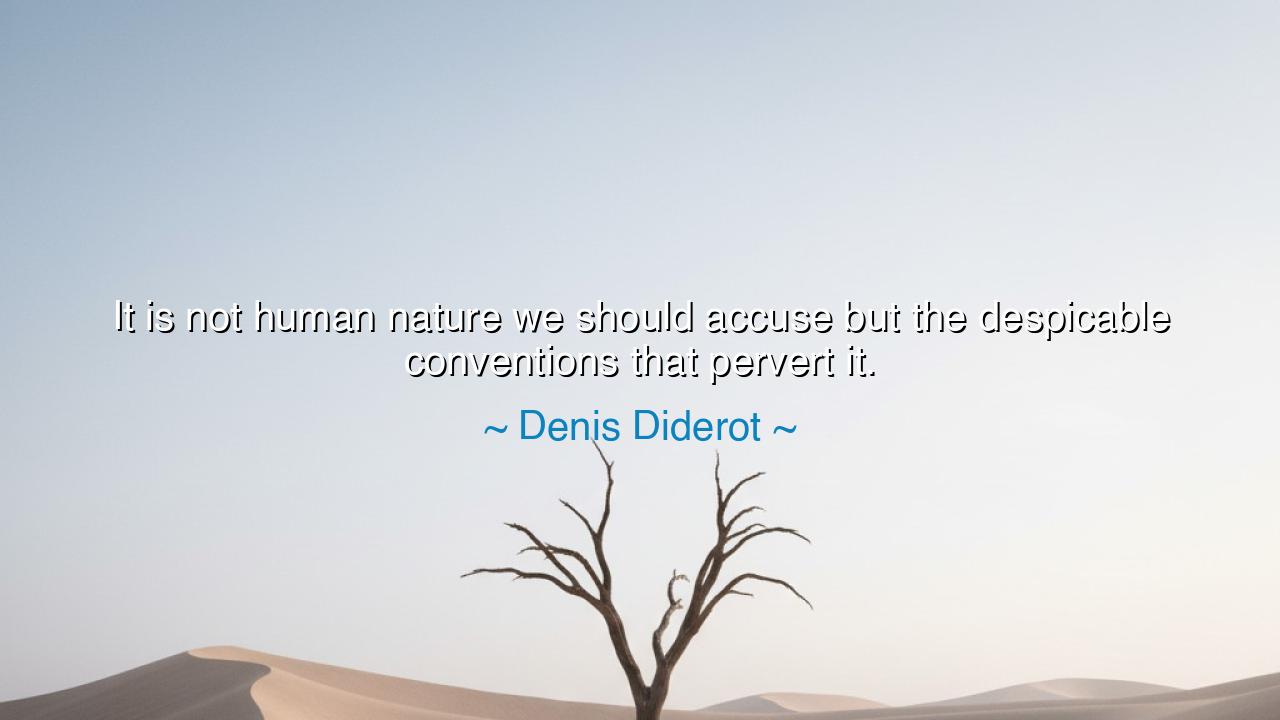
It is not human nature we should accuse but the despicable
It is not human nature we should accuse but the despicable conventions that pervert it.






Denis Diderot, the philosopher of the Enlightenment and editor of the great Encyclopédie, once declared: “It is not human nature we should accuse but the despicable conventions that pervert it.” In this cry we hear both compassion for humanity and condemnation of the false systems that bind it. Diderot, living in an age where kings and priests claimed absolute power, understood that men and women are not born corrupt, but become enslaved to habits, customs, and laws that twist what is noble within them. His words summon us to distinguish the eternal goodness of human nature from the chains of corrupt society.
For what is human nature? It is the seed of reason, compassion, and creativity planted in every soul. The infant is not born with greed or hatred in its heart. The child reaches out for love, for fairness, for curiosity. But as the child grows, the weight of conventions—unjust hierarchies, empty traditions, cruel prejudices—presses upon it, bending it away from its natural course. Thus, Diderot does not blame the clay itself, but the hand of the potter who misshapes it.
The ancients, too, knew this struggle. Confucius spoke of li—the rituals of society—and warned that when rituals lose their spirit, they become hollow cages. Plato, in his Republic, warned against societies that teach falsehood as truth, for they warp the souls of their citizens. And in every age, prophets have risen to remind humanity that the problem lies not in the heart itself but in the structures that corrupt the heart. Diderot’s voice stands in this lineage: he calls us not to despise mankind, but to reform the conditions that deform mankind.
History gives us shining proof. Consider the abolition of slavery. For centuries, it was justified as natural, as though human beings were born to be property. Yet when those conventions were overturned, and the shackles broken, the truth was revealed: men and women long thought inferior were in truth no different, capable of the same greatness when freed. Slavery did not reveal the truth of human nature, but only the perversions of unjust custom. Once the conventions were destroyed, the nobility of the human spirit rose again.
There is also a profound warning in Diderot’s words. Too often, people despair of mankind, declaring humanity hopeless, violent, greedy, selfish. But this despair is misplaced. To accuse human nature is to condemn what is sacred. Instead, we must open our eyes to the despicable conventions—the corrupt politics, the blind traditions, the systems of power—that twist men’s wills. If we wish for a better world, we must not curse our nature but reform our customs. For as the soil can produce flowers or weeds depending on how it is tended, so human beings will rise or fall according to the society that shapes them.
The lesson for us is clear: never despair of human nature, for it holds within it the capacity for truth, goodness, and beauty. Instead, turn your energy toward identifying and dismantling the false conventions that bind us—whether they be unjust laws, destructive habits, or cultural practices that harm the weak. Trust the soul, but question the system.
Practical action flows from this. Look at the customs you follow, the traditions you inherit, the institutions you serve. Ask yourself: Do these honor the dignity of human nature, or do they pervert it? If they honor, preserve them. If they corrupt, resist them. Support reforms that uplift the poor, the voiceless, the forgotten. Create spaces—whether in your home, your work, or your community—where compassion and reason can flourish unchained. In doing so, you restore human nature to its rightful path.
Thus Diderot’s words endure as both shield and sword: a shield to protect the dignity of mankind, and a sword to strike against corrupt conventions. “It is not human nature we should accuse but the despicable conventions that pervert it.” Let us therefore love mankind, even in its stumbling, and wage war not upon the heart of man, but upon the chains that bind it. For only then shall the natural goodness within us rise like the sun, free and radiant across the world.






AAdministratorAdministrator
Welcome, honored guests. Please leave a comment, we will respond soon